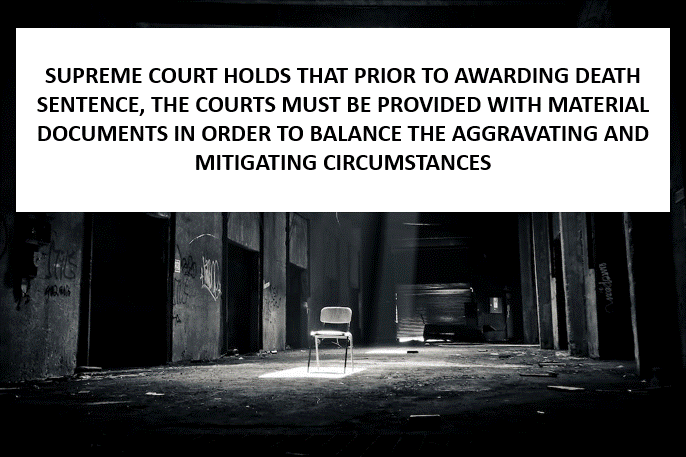SUPREME COURT HOLDS THAT PRIOR TO AWARDING DEATH SENTENCE, THE COURTS MUST BE PROVIDED WITH MATERIAL DOCUMENTS IN ORDER TO BALANCE THE AGGRAVATING AND MITIGATING CIRCUMSTANCES
A Two Judge Bench of the Supreme Court comprising of Justice K.M. Joseph and Justice S. Ravindra Bhat passed a Judgment dated 21.04.2023 in ‘Vikas Chaudhary vs The State of Delhi in Criminal Appeal No. 2276 of 2022’ and held that prior to awarding death sentence to an accused, the Trial Court must be provided with adequate material such as the psychologic evaluation reports of the accused, etc, in order to balance the aggravating factors with mitigating circumstances and facilitate the Courts to apply their judicious mind and decide upon the necessity to award capital punishment.
Facts:
1) An FIR bearing No. 34/2003 dated 19.01.2003 was registered at Police Station (PS) Ashok Vihar, Delhi against one, Vikas Chaudhary (Accused-Appellant) upon receiving a Complaint from one, Mr. Vimal Chadha (Complainant) stating that his 20-year-old son, Parakh Chadha (Deceased) was missing.
2) The Ld. Additional Sessions Judge, Tis Hazari Court, Delhi (Trial Court) passed a Judgment dated 13.11.2017 in Sessions Case No. 27963 / 2016 and convicted the Accused–Appellant for committing the offence of murder and kidnap of the Deceased and sentenced him to an imprisonment for a fixed term of 30 years without remission.
3) Aggrieved by the Trial Court Order dated 13.11.2017, the Accused-Appellant filed Criminal Appeal No. 319 / 2018 before the High Court of Delhi.
4) The High Court vide its Judgment dated 31.10.2018 upheld the Trial Court Order dated 13.11.2017 and confirmed the conviction of the Accused-Appellant.
5) Aggrieved by the High Court Judgment dated 31.10.2018, the Accused-Appellant filed Criminal Appeal No. 2276 of 2022 before the Supreme Court seeking correctness of the sentence imposed by the Trial Court.
Arguments
(i) The Counsel for the Accused-Appellant stated that it was not within the jurisdiction of the Trial Court to provide for a specific term of punishment or until the end of ordinary life, as an alternative to death penalty.
(ii) The State argued that the conviction was based on concurrent findings and that the act of abduction later resulting in the death of the Deceased would amount to a cold-blooded murder falling under rarest of rare cases.
(iii) The State also contended that although only the High Court and the Supreme Court had the power to pass a sentence- in excess of life imprisonment and lesser than capital punishment- but in the present case, the Trial Court had exercised such power; however, the same would not vitiate the sentence altogether, as the High Court had affirmed the sentence awarded by the Trial Court. Thus, the spirit of law was upheld.
Supreme Court Analysis:
The Apex Court passed a Judgment dated 21.04.2023 in Criminal Appeal No. 2276 of 2022 and made the following observations:
(1) That in Bachan Singh v. Union of India, the Apex Court upheld the imposition of capital sentence, and observed that capital punishment should be awarded only in the rarest of rare cases. However, in the subsequent judgments, the concept of capital punishment evolved through a principled approach.
(2) That a balance sheet of aggravating and mitigating circumstances need to be drawn, where the mitigating circumstances have to be accorded full weightage and a just balance has to be struck between the aggravating and the mitigating circumstances before the option is exercised.
(3) That the obligation to carry out a balancing interest is upon the courts imposing the sentence in the first instance, i.e., the Trial Courts; and further, the prosecution is under an obligation to show that the mitigating circumstances are absent, especially that no chances of reformation of the accused are present.
Conclusion:
Thus, applying the aforesaid principles of law to the present facts, the Supreme Court vide Judgment dated 21.04.2023 modified the sentence awarded to the Accused-Appellant to a minimum term of 20 years of actual imprisonment on the ground that the Accused-Appellant provided the Apex Court with psychological and psychiatric evaluation reports, report on nature of work done and report of probation officer which clearly demonstrated his satisfactory conduct and positive attitude. Therefore, the Apex Court partly allowed the Criminal Appeal No. 2276 of 2022 filed by the Accused-Appellant, as the aforementioned reports indicated ample scope of his reintegration into the society.
Shalini Donthi
Legal Associate
The Indian Lawyer





































Leave a Reply